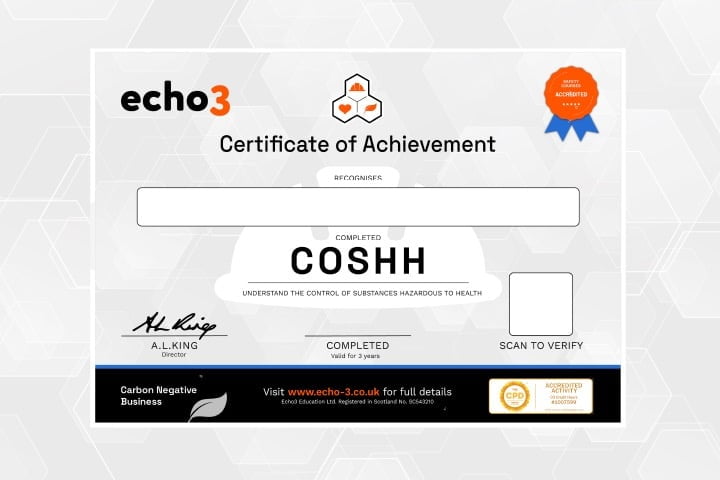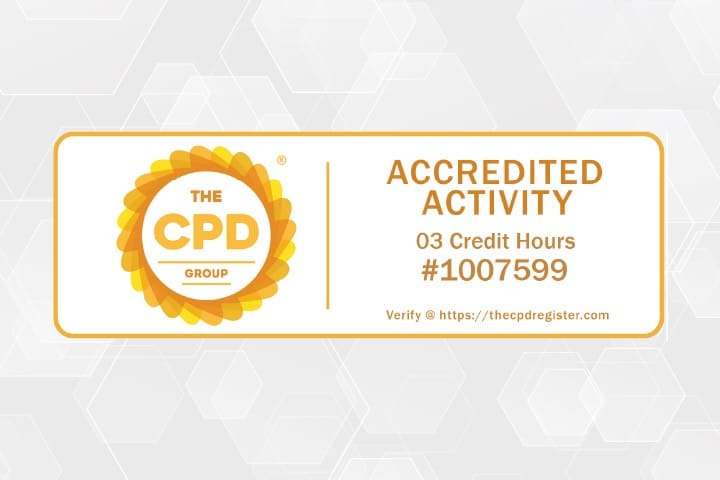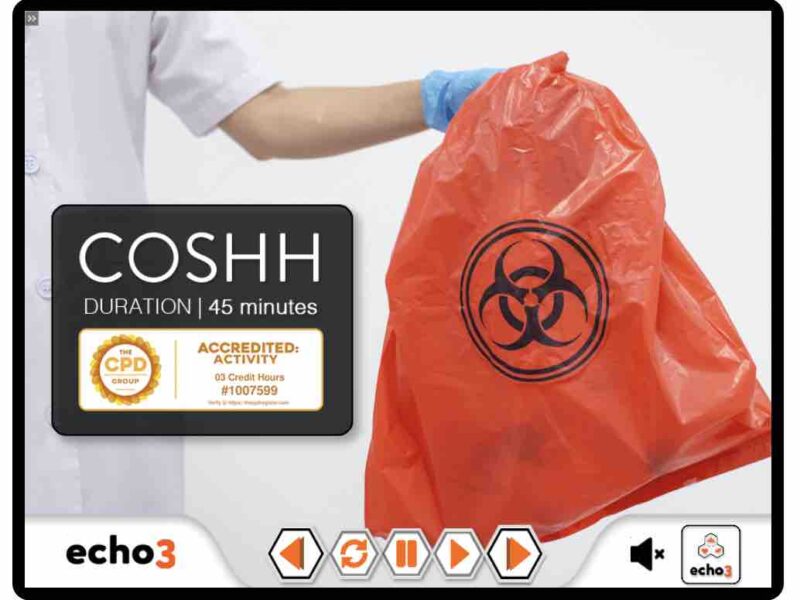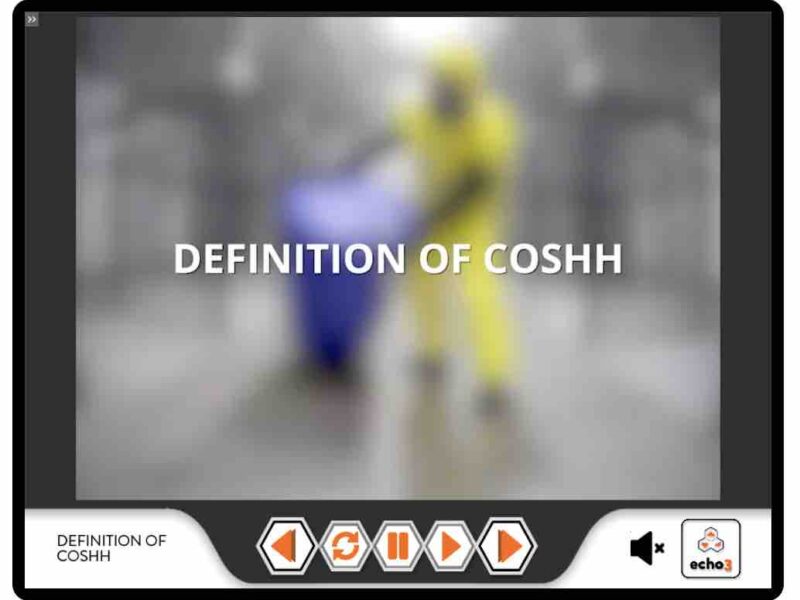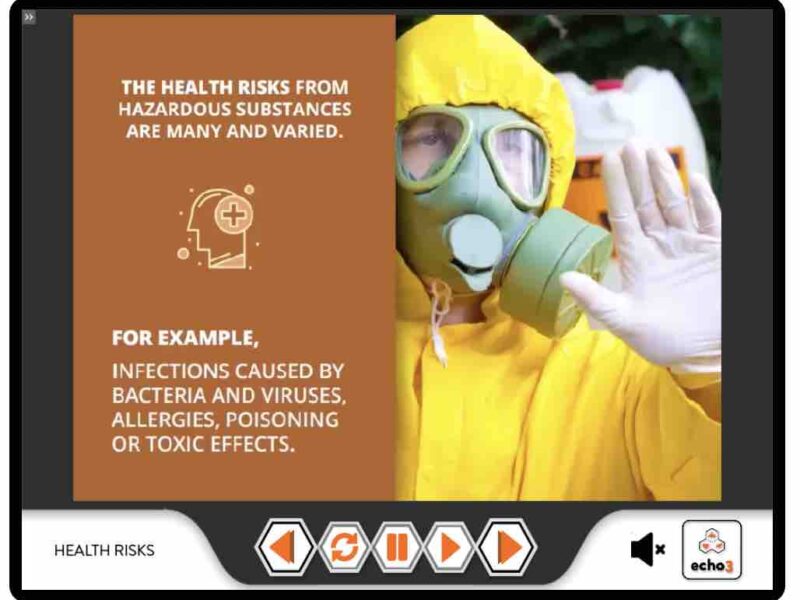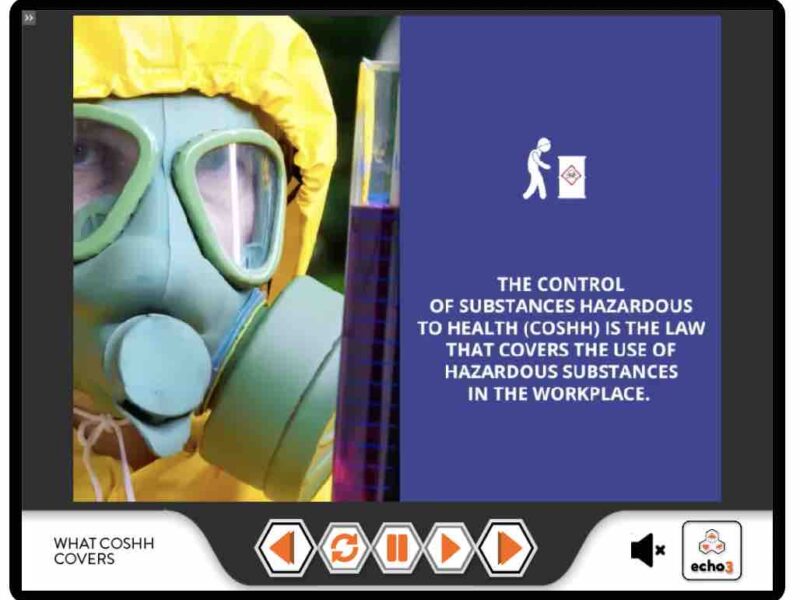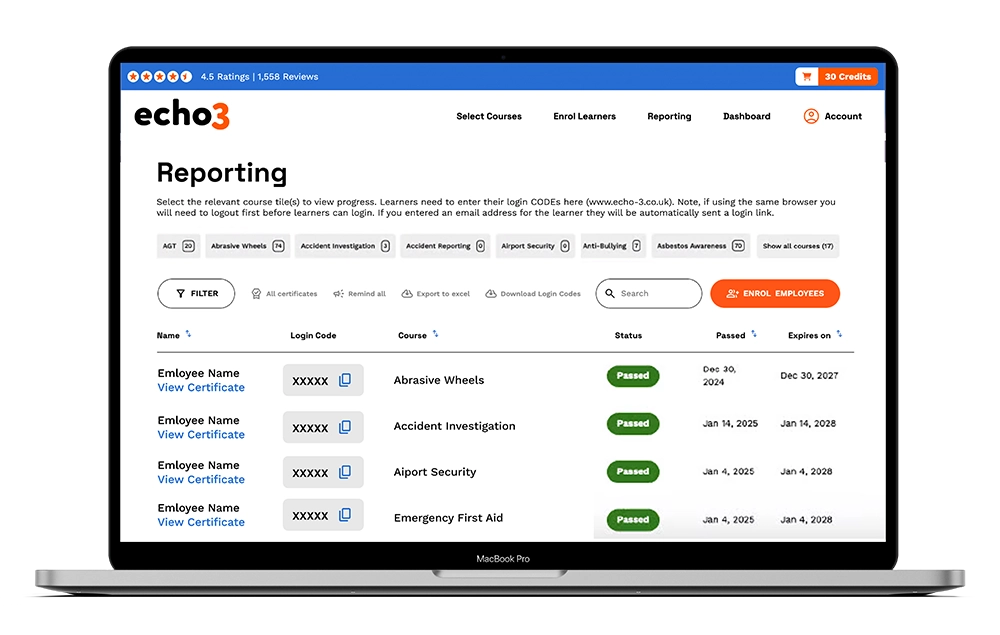Online COSHH Course
COSHH stands for the Control of Substances Hazardous to Health Regulations 2002.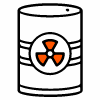
The Echo3 COSHH course is designed to help learners understand these regulations and their responsibilities under the law. It provides the knowledge needed to create a compliant workplace where risks from hazardous substances are properly managed.
Hazardous substances are any materials used or produced at work that could harm the health of employees, contractors, or the public. These substances pose a wide range of hazards and are commonly grouped into nine categories, each represented by a hazard pictogram.
Most workplaces use or produce hazardous substances, whether in cleaning, manufacturing, healthcare, or construction, it is essential to know how to manage the risks safely and legally.
The Echo3 COSHH course takes just 60 minutes to complete and covers how to recognise hazardous substances, understand warning labels, apply control measures, and maintain a safe working environment.
A COSHH certificate is emailed to learners upon successful completion.
COSHH Course Content
Unit One – The COSHH Regulation and its requirements
This unit introduces the COSHH regulations, explaining what hazardous substances are and outlining the legal responsibilities of both employers and employees. Topics include identifying hazardous substances, understanding associated health risks, relevant legislation such as the Health and Safety at Work Act (1974), COSHH signage, and a summary of key duties in the workplace.
Unit Two – Potential Health Risks
This unit explores the potential health risks associated with working with or around hazardous substances. It outlines common conditions such as dermatitis, asthma, and cancer, and explains how exposure can occur. You’ll also learn about key symptoms, practical control measures, and steps you can take to protect both yourself and others from harm in the workplace.
Unit Three – COSHH Proactive Safety Controls
In this final unit, we cover the responsibilities of both employers and employees when working with hazardous substances, including safe storage, disposal practices, and effective responses to accidental spills. Key topics include risk assessments, control measures, hazard communication, waste management, and environmental protection.
Unit Five – Responding to Emergencies & Spillages
In this final unit, you will learn how to effectively respond to emergencies and spillages involving hazardous substances, including medical emergencies and safe containment procedures.
Unit Six – Quiz
The COSHH course concludes with a 15-question multiple-choice quiz. Achieve a score of 80% or higher to demonstrate your understanding of the key concepts, and your certificate will be emailed upon successful completion. The quiz can be retaken if needed.
COSHH Course Certificate
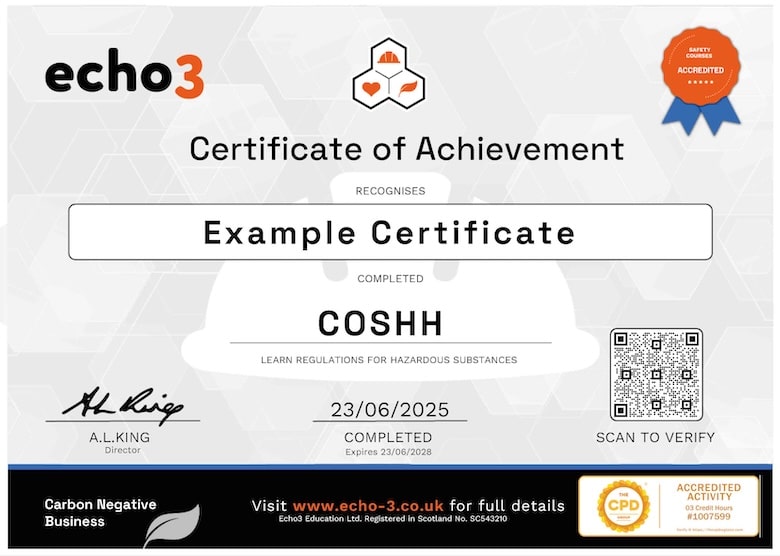
Download and Print Your Certificate
- Written in compliance with the UK COSHH Regulations
- Developed by qualified health and safety professionals
- Last Updated August 2023
- To gain the certificate you must complete the assessment which involves 15 questions.
- The online COSHH certificate is valid for 3 years.
Course Preview
Echo3 courses include engaging motion-graphic video content, with full english subtitles
Reviews
How to Get Certified in 3 Steps
Individual Learners

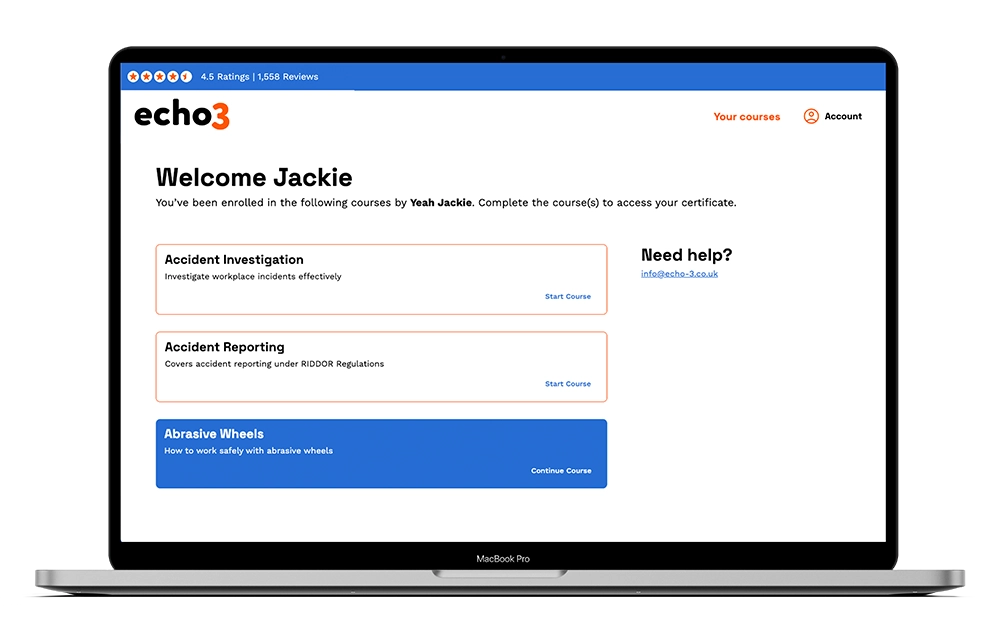
Benefits for Individuals
-
Engaging video-based content
-
Learner dashboard included
-
Instant access after payment
-
Free course retakes
-
Shareable digital certificate
 QR Code Certificate
QR Code Certificate




Bulk Buying Discounts
What are the COSHH course learning objectives?
The objectives of the Echo3 COSHH course are to equip learners with the essential knowledge to:
- Understand legal responsibilities under COSHH regulations
- Recognise hazardous substances and interpret their labels
- Understand the purpose and importance of safety data sheets
- Recognise the value of reading product labels carefully
- Appreciate the role of personal protective equipment (PPE)
- Learn how to store hazardous substances safely
- Know how to dispose of substances correctly and safely
- Respond appropriately to spills or emergency situations
When do COSHH Regulations apply?
If there are any materials or substances that could harm the health of employees then the COSHH regulations apply.
These substances are know as Hazardous Substances when stored and Dangerous Goods when in transport.
There are more and are more common than you may think. In fact, the majority of businesses use substances, that could cause harm to employees, contractors and members of the public.
Hazardous substances can take many forms and include:
- chemicals
- products containing chemicals
- fumes
- dusts
- vapours
- mists
- nanotechnology
- gases and asphyxiating gases
- biological agents such as germs
Ill health from hazardous substances is preventable by staff adopting the best-practice detailed this course. Some specific hazardous substances such as Asbestos, Mercury, Benzene and Nitrogen have their own courses.
Who should take COSHH training?
Who is the Echo3 COSHH Course For?
The Echo3 COSHH course is designed for anyone managing or supervising staff in environments where hazardous substances are present.
Managers and supervisors play a key role in ensuring compliance with safety regulations and protecting employees from exposure to harmful substances. COSHH training is essential to help them meet these responsibilities.
This COSHH course is suitable for all industries. However, if you work in construction, we offer a dedicated COSHH for Construction course, which also covers sector-specific risks such as concrete, asbestos, and lead.
All staff working with hazardous substances should receive appropriate training. For workplaces that involve particularly dangerous substances, employers must provide specific training. Echo3 offers specialised courses on substances such as Asbestos, Hydrogen Sulphide (H₂S), Benzene, and Nitrogen.
Examples of roles where COSHH likely applies include:
- Cleaning – exposure to chemicals that can cause burns or skin conditions
- Construction – regular use of hazardous building materials
- Bakeries – flour and dust may cause respiratory or skin issues
- Garages – exposure to solvents, oils, exhaust fumes, and greases
- Healthcare – risk of infection from biological agents
- Laboratories – handling of chemicals and flammable substances
- Warehouses – management of a wide range of hazardous materials
What is a hazardous substance?
In COSHH regulations a hazardous substance is ‘any substance that may cause harm to your health‘. This is a broad definition, however, common examples include;
- chemicals
- products containing chemicals
- fumes
- dusts
- vapours
- mists
- nanotechnology
- gases and asphyxiating gases and
- biological agents (germs). If the packaging has any of the hazard symbols then it is classed as a hazardous substance.
- Germs
- Any substance with a WEL or Workplace Exposure Limit
Asbestos, lead and radioactive substances are all hazardous substances under COSHH. Because the hazards are so high they have their own specific regulations outlining what employers must do.
What are the 9 hazard pictograms?
The 9 ‘hazards warning symbols’ or ‘hazard pictograms’ from the Global Harmonised System (GHS) are details below. These symbols are used on packaging across Europe to identify the hazard of a particular substance. Multiple hazard warning symbols are used when a substance has multiple hazardous properties.
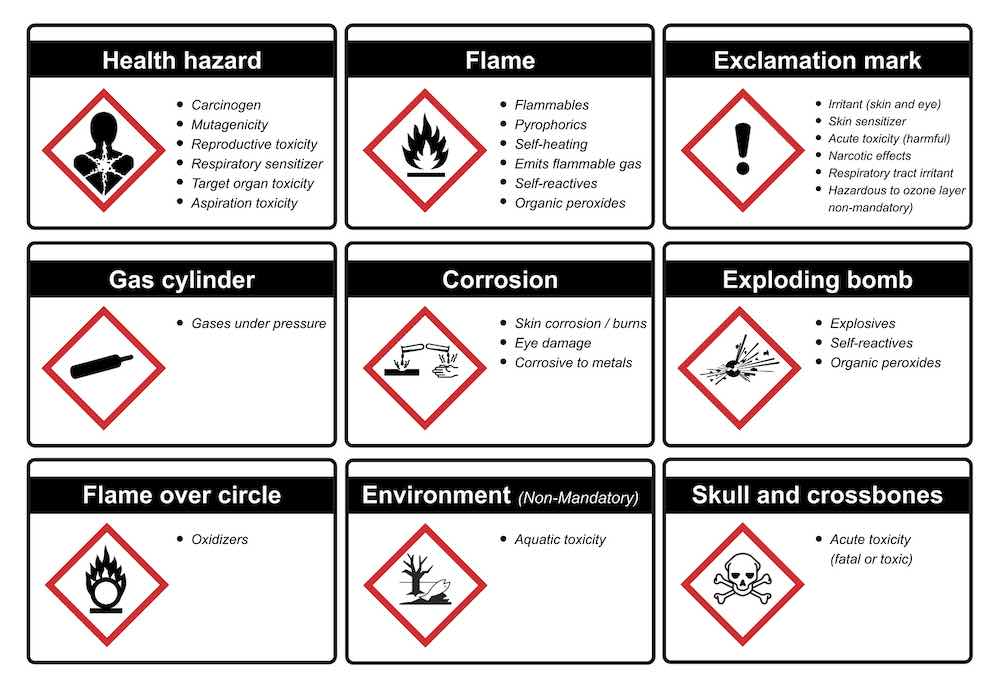
What does the COSHH regulation require?
In short, COSHH regulations require that employers reduce the risk to staff from hazardous substances to as low as reasonably practicable.
In practice this means first undertaking a COSHH assessment. Walking round your business and noting which harmful substances are or could at time be present. Then consider what activities expose your staff to these substances and finally then what can be done to reduce the risk that someone might be harmed. All the steps you take should be documented.
One helpful step when substances cannot be eliminated from the workplace is to provide Hazardous Substances training to staff so they are aware of the risks and can therefore better avoid them.
Why take an online COSHH training course?
Every year, thousands of workers suffer illness due to exposure to hazardous substances—developing conditions such as asthma, cancer, and dermatitis. You may already be aware of hazardous substances used in your workplace, or those created during work processes, such as welding fumes or quarry dust.
While the hazard posed by a substance remains constant, the risk it presents can vary depending on how it’s used or managed. For example, storing a flammable substance away from an ignition source significantly reduces the risk of explosion.
Under COSHH regulations, employers are required to regularly assess and adequately control these risks to protect workers’ health.
This online COSHH course supports that goal by equipping learners with the knowledge needed to identify hazardous substances, understand the dangers they pose, and apply safe working practices to minimise risk.
Related Courses
Asbestos Awareness – IATP accredited for those who might encounter asbestos at work (CAT-A)
Benzene Awareness – How to work safely where Benzene may be present
Hazardous Substances – How to work safely where hazardous substances maybe present
H2S Awareness – How to work safely where Hydrogen Sulphide could be present
Nitrogen Awareness – How to work safely where Nitrogen could be in high concentration
PPE – Know the importance of PPE
Spill Kit (Chemicals & Oils) – Know how to clean up Oil or Chemical spills
Transporting Dangerous Goods – How to transport dangerous goods (hazardous substances) safely.
Access all Echo3 courses with credit.






